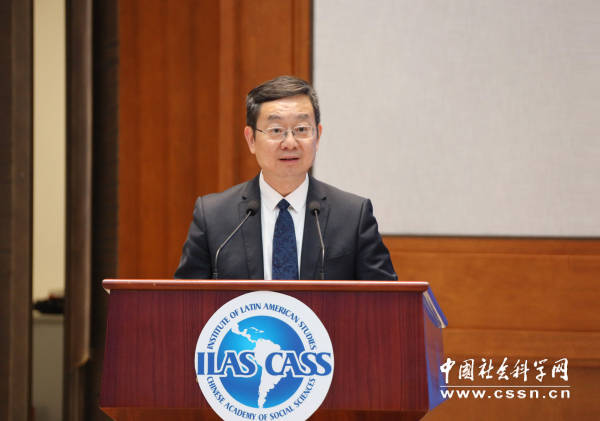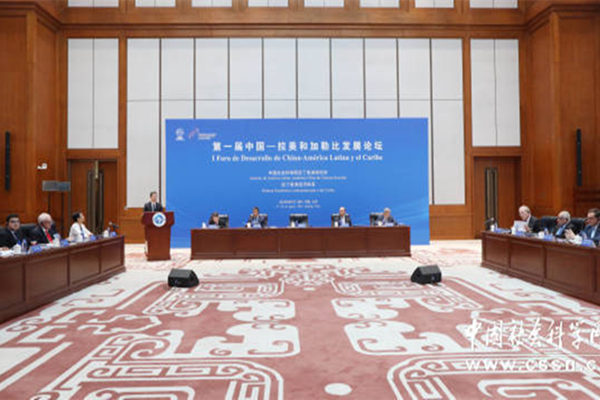


Forum seeks ways to deepen China-LAC cooperation

CASS President Gao Xiang delivers a speech. Photo: Zhang Zhe/CSSN
Experts and scholars from China and Latin American and Caribbean (LAC) countries such as Brazil, Mexico, and Honduras, as well as representatives from several international and regional organizations, convened in Beijing on Aug. 27–28 for the First Forum on the Development of China and Latin America and the Caribbean. The forum featured in-depth discussions on a range of topics, including China-LAC trade, international development cooperation, and energy, infrastructure, and industrial investment.
In his speech at the forum, President of the Chinese Academy of Social Sciences (CASS) Gao Xiang noted that this year marks the 10th anniversary since Chinese President Xi Jinping proposed building a China-LAC community with a shared future, emphasizing that China-LAC ties have entered a new era characterized by equality, mutual benefits, innovation, and openness, all aimed at improving the wellbeing of the people in both regions.
Gao called on the two sides to uphold multilateralism and refine the global governance system, contributing their strengths toward fostering a more equitable and orderly multipolar world, and promoting inclusive economic globalization. He also stressed the importance of extensive consultation and joint contribution in advancing common development and enhancing the alignment between the Belt and Road Initiative (BRI) and the mid- and long-term development strategies of LAC countries. It is likewise pivotal to deepen people-to-people exchanges through mutual learning among civilizations, Gao said.
Since the beginning of new era, under the guidance of Xi Jinping Thought on Diplomacy, China has upheld the banners of peace, development, cooperation, and mutual benefit to deepen its cooperation with LAC countries across political, economic, social, and cultural spheres, said Zhao Zhimin, secretary general of CASS. He added that this collaboration has set a new example of South-South cooperation, characterized by mutual political trust, mutual economic benefits, mutual social assistance, and mutual cultural learning. China-LAC cooperative development has grown increasingly holistic, deep, balanced, and sustainable, as both sides continue to make significant progress toward building a China-LAC community with a shared future.
Clarems Endara, permanent secretary of the Latin American and Caribbean Economic System (SELA), described China-LAC relations as one of the most dynamic bilateral partnerships in the contemporary world. He highlighted that China is the LAC region’s second-largest trade partner and that the China-proposed BRI has provided substantive development opportunities for LAC countries. Looking to the future, Endara expressed the anticipation for broader cooperation in areas such as poverty reduction, energy, education, and public health.
Over the past decade, China and LAC have, through their comprehensive development partnership, established various dialogue platforms in such fields as trade, investment, infrastructure, sci-tech innovation, agriculture, enterprise cooperation, youth, think tanks, the environment, local government collaboration, and poverty reduction and development, achieving fruitful results, observed Long Guoqiang, deputy director of the Development Research Center of the State Council of China.
As the world has entered a phase of turbulence and transformation, China-LAC cooperation faces both opportunities and challenges, Long said, adding that the partnership should build on its existing achievements to further improve and expand, thus steadily unlocking new vitality and injecting fresh momentum.
Qiu Xiaoqi, special representative of the Chinese Government on Latin American Affairs, urged Chinese and LAC academics to stay attuned to the current global dynamics and respond to the call of the people to carry out in-depth research and offer advice on key issues like China-LAC cooperation on industrial and supply chains, the construction of free trade zones, and strategies to counter attempts by certain countries to decouple and disrupt these chains or engage in trade protectionism. Qiu encouraged scholars to promptly refute unfounded claims, such as accusations of “overcapacity” and “debt traps,” in order to foster a favorable environment for pragmatic China-LAC cooperation.
CASS Member Zhang Yuyan pointed out that economic opening up is the fundamental pathway for promoting division of labor and professionalized production, which in turn generates trade benefits. Mutually beneficial China-LAC cooperation to achieve common development is essentially about deep participation in the global division of labor and professionalization through economic opening up and benefiting through international trade. From this perspective, collaborative efforts are even more necessary for China and LAC countries to drive the joint construction of an open world economy, ultimately contributing to the betterment of humanity.
The forum was co-hosted by the Institute of Latin American Studies at CASS and SELA.

A scene of the forum Photo: Zhang Zhe/CSSN
Editor:Yu Hui
Copyright©2023 CSSN All Rights Reserved